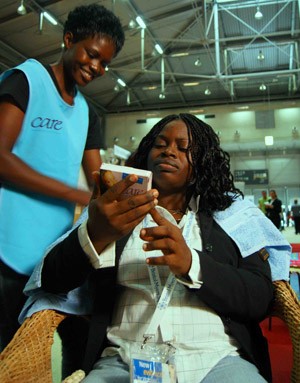
When she was younger, Tarisai “Tears” Wenzira dreamed of becoming a nurse, but when she was forced to drop out of school to support an extended family after her parents’ death, money was short.
With little education and few job opportunities, Wenzira drifted into marriage and motherhood at 17. After a few years, her marriage fell apart. Tears returned to her grandmother’s home, daughters in tow. Again, she needed a job to help support her family and soon found one as a hairdresser. Then, Population Services International (PSI), with funding from USAID, trained Wenzira to promote and sell female condoms. The effort to promote female condoms is part of USAID’s “ABC” broad approach to HIV prevention and control: abstinence, being faithful, and correct and consistent condom use.
“A field officer visited our salon and introduced the care female condom and its role in HIV prevention,” Wenzira said. “She demonstrated how it is used and coached us on how to teach our clients on correct use of the condom as well as negotiating for its use with their partners. She sold some condoms to us for resale to our clients, and when I realized some profit from the sales, I became interested.”
Although 21 percent of Zimbabwean women—compared with 14 percent of men—are HIV-positive, cultural and gender dynamics often prevent women from purchasing or using condoms. According to research, hair salons can help break through these cultural barriers. A majority of women in Zimbabwe visit a hair salon at least once a week and spend about 45 minutes to an hour each visit. Hair dressers trained through this program can often discuss how to use a condom and let clients touch and feel the product.
Wenzira is one of more than 2,000 hair dressers in Zimbabwe who work on the care HIV prevention program, co-funded by USAID and the U.K. Department for International Development. She sells 100 female condoms per month and makes enough to buy basics like bread and milk for her family.
“Despite my incomplete secondary education, I can confidently speak about the care female condom to women and men, some of whom are professionals.”







Comment
Make a general inquiry or suggest an improvement.